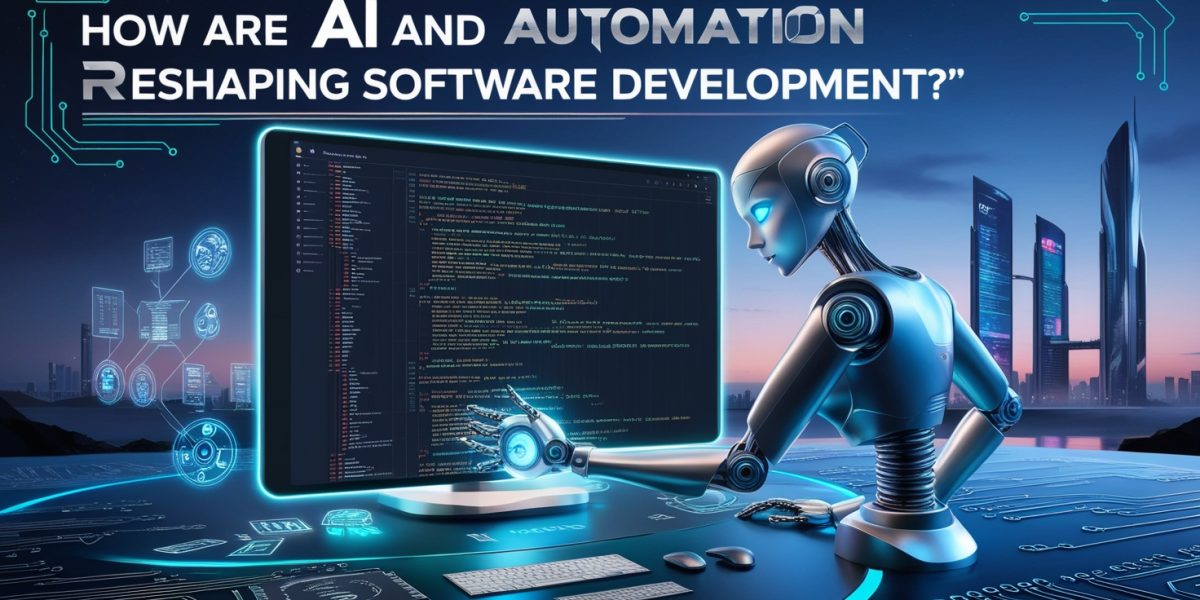Artificial intelligence (AI) and automation are at the forefront of the amazing shift that is taking place in the software development industry. Not only are these technologies making the development process quicker and more efficient, but they are also bringing about a fundamental shift in the way developers approach coding, testing, deployment, and maintenance.
The day-to-day activities of developers are being transformed by these technologies, which are making their jobs more efficient, quicker, and more streamlined. I have witnessed this transformation myself. This article will discuss how artificial intelligence (AI) and automation are transforming the world of software development, as well as the implications that this has for both software engineers and businesses.
Uncharted Territory in the Field of Software Development
Historically, the process of developing software has been characterized by a significant degree of manual labor, with several operations that are repetitive in nature, including coding, testing, debugging, and deployment.
Programmers would frequently devote a significant amount of time, sometimes even days, to writing code and verifying that it was free of errors and faults. This procedure, on the other hand, has grown more efficient, intelligent, and dependable as a result of the proliferation of the leading AI mobile app and automation programs.
In my opinion, artificial intelligence and automation are not merely improving the process of developing software; rather, they are completely transforming it. With the help of these technologies, human error is being substantially reduced, development cycles are being sped up, and even new chances for people who are not developers to engage in the process of producing software are being made available.
Because of the deep consequences that this transition has for both businesses and developers, it is very important for everybody who is involved in the technology sector to pay attention to this sphere.
The Importance of AI in the Process of Software Development
AI is increasingly becoming a central player in the development of software. From writing code to debugging and even offering suggestions, AI is now an invaluable tool for developers.
How AI Contributes to the Generation of Code
AI-powered tools such as GitHub Copilot, ChatGPT, and Codex have made a huge impact on the coding process. These tools can assist developers by offering code suggestions in real time, which can drastically cut down on the time it takes to write functional code. They analyze vast amounts of data to generate code snippets that are contextually appropriate for the task at hand.
- Code completion: With tools like Copilot, I have experienced how they predict what a developer is trying to write and offer the next line of code, speeding up the process significantly.
- Error detection: AI tools can spot bugs before they even make it to production, reducing the chances of human error.
Using Artificial Intelligence for Debugging and Refactoring
Debugging is a time-consuming task, and it is often a process that requires a deep understanding of the code base. However, AI tools are now helping to identify potential issues automatically, making it easier for developers to find and fix bugs.
- Automated debugging: Tools like DeepCode analyze your code to detect patterns and anomalies that might suggest errors.
- Refactoring: AI can also suggest better ways to structure your code, helping improve maintainability and performance.
In this way, AI plays an essential role in simplifying the developer’s workload by handling some of the most tedious and error-prone tasks.
The Application of Automation in Software Development
Automation in software development refers to the use of software tools and scripts to automate tasks that would otherwise require manual input. These tasks can range from running tests to deploying software or even managing cloud infrastructure. Automation is enabling developers to focus more on creativity and problem-solving rather than spending time on repetitive tasks.
CI/CD Pipelines
Continuous Integration (CI) and Continuous Delivery (CD) are two critical practices in modern software development. Through automation, CI/CD pipelines streamline the entire process of integrating code changes and deploying them to production. These automated pipelines ensure that every change is tested and deployed efficiently.
- Automated testing: Automated test suites run each time new code is added, reducing the chances of bugs slipping through the cracks.
- Faster deployment: Automated CD pipelines allow developers to release updates frequently, providing quicker access to new features for end users.
Secondly, automation in deployment has made it easier for development teams to push updates and fixes more rapidly, leading to an agile and responsive development environment.
Automated Testing Models
Testing is one of the most critical aspects of software development. It ensures that the software works as intended and meets the requirements. In the past, testing was often a manual process that could take weeks or even months. Today, automated testing frameworks such as Selenium, TestComplete, and JUnit are taking over this responsibility.
- Faster testing: Automated tests can be executed in a fraction of the time it would take to test manually, allowing developers to focus on improving features rather than troubleshooting.
- Regression testing: These automated tests also make it easier to run regression tests whenever new code is added, ensuring that no new issues are introduced.
With that said, automated testing is also improving the quality of software by ensuring that issues are detected early in the development process.
AI and Automation Synergy
Rather than competing technologies, artificial intelligence and automation cooperate to improve the software development process, therefore enabling smarter and more efficient technology. Combining the data analytic powers of artificial intelligence with automation helps creators create more intelligent, dependable systems.
Many tools combine technology to enable predictive issue identification, automated code quality analysis, and simplified chores including code reviews and deployments. These AI-powered automation solutions improve code quality, lower downtime, and help to minimize human mistakes. AI-driven code review tools, for instance, can spot possible problems before they ever get tested early in the development process.
Predictive analytics driven by artificial intelligence can also examine prior data to identify areas of potential bug occurrence, therefore enabling teams to proactively fix problems. In offshore software development firms, ultimately the synergy of artificial intelligence and automation gives significantly more value than either could supply on its own.
Advantages of Artificial Intelligence and Automation in Software Development
As we’ve seen, AI and automation have brought about profound changes in how software is developed. But what does this mean in terms of benefits?
- Reduced time-to-market: Automation speeds up tasks such as coding, testing, and deployment, allowing developers to push updates and releases faster.
- Increased code quality: AI tools help detect errors early in the development process, reducing the chances of bugs making it to production.
- Lower costs: By automating repetitive tasks, companies can allocate resources to more important tasks, reducing the overall cost of software development.
- Better scalability: Automation tools make it easier to scale applications and systems, ensuring that they can handle growing user demands.
With this combination, companies are able to stay competitive by getting products to market faster, with fewer errors, and at a lower cost.
Artificial Intelligence and Automation: Their Future in Software Development
With even more creative tools and methods just ahead, artificial intelligence and automation are here to stay. The changing terrain of development will make it simpler for non-technical individuals as well as seasoned professionals to help create software. Rising no-code and low-code platforms which enable people with little to no coding knowledge to create apps using visual interfaces and pre-built components are a major trend driving this change.
These systems will rely much on artificial intelligence since it provides intelligent recommendations and automates difficult reasoning. Within the DevOps space, artificial intelligence and automation are revolutionizing software deployment, infrastructure needs prediction, system monitoring, and pipeline optimization for teams.
These developments will help DevOps teams to be more responsive to user needs and nimble. From predictive maintenance to smarter testing and debugging tools, artificial intelligence will eventually keep improving how we create and maintain software, becoming ever more important in the software development process.
Conclusion
All things considered, artificial intelligence and automation are transforming software development in heretofore unthinkable ways. These tools enable developers to create smarter code, test faster, deploy with confidence, and finally produce better software. As artificial intelligence and automation keep growing, we should anticipate faster, more dependable, easier access to software development.
If you work in development, using AI and automation solutions to simplify your process can help you keep ahead of current trends. If you run a company, now is the time to make investments in these technologies to increase output and keep competitive in the market.
Finally, there are lots of tools and materials available to assist you learn and apply artificial intelligence and automation in software development if you are just starting with these technologies. Participate, try several tools, and see how they might change your procedures of growth.
I would like you to let me know how automation and artificial intelligence are influencing your software development job. See obstacles coming or do you believe these technologies represent the future? Comment below to start the dialogue!












